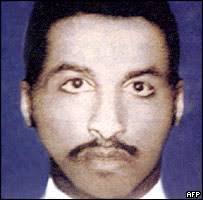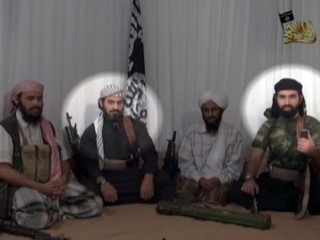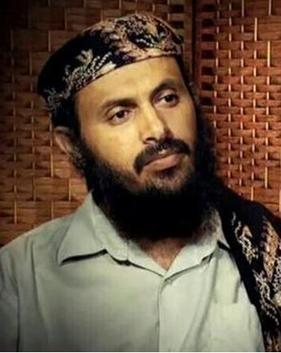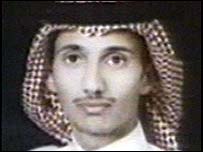Obaida Abdul-Rahman Al Otaibi is a Saudi Arabian journalist who was on the Saudi list of most wanted suspected terrorists. [1]
Obaida Abdul-Rahman Al Otaibi is a Saudi Arabian journalist who was on the Saudi list of most wanted suspected terrorists. [1]
Obaida Attended Imam Mohamed Bin Saud University in the late 1990s, where he earned a degree in media. [1] After graduation, he started working at Saudi Al-Jazirah. His former boss, Abdul-Elahi Al Qasim stated he was one of the first Saudi journalists to include his email address in his byline. He stated that Obaida had shown no signs of extremist ideology while with the paper.
Obaida left Saudi Arabia for the United Arab Emirates in 2005.
The most wanted list was published in late January 2009, and includes 85 names. Obaida's is the fiftieth name on the list. His listing accused him of "planning to target vital infrastructure within Saudi Arabia." [1]
Obaida attended the same high school, the Al Shifa Religious Academy, as "Eisa Al-Awsham, a former Al Qaeda commander." [1] Eisa Al-Awsham was killed in a shootout with Saudi security officials on July 19, 2004.

The House of Saud is the ruling royal family of Saudi Arabia. It is composed of the descendants of Muhammad bin Saud, founder of the Emirate of Diriyah, known as the First Saudi state (1727–1818), and his brothers, though the ruling faction of the family is primarily led by the descendants of Abdulaziz bin Abdul Rahman, the modern founder of Saudi Arabia. It forms a subtribe of the larger prominent ancient Banu Hanifa tribe of Arabia, from which well known 7th century Arabian theologist Maslama ibn Ḥabīb originates. The most influential position of the royal family is the King of Saudi Arabia, an absolute monarch. The family in total is estimated to comprise 15,000 members; however, the majority of power, influence and wealth is possessed by a group of about 2,000 of them. Some estimates of the royal family's wealth measure their net worth at $1.4 trillion.This figure includes the market capitalization of Saudi Aramco, the state oil and gas company, and its vast assets in fossil fuel reserves, making them the wealthiest family in the world and the wealthiest in recorded history.

Abdel Aziz Issa Abdul-Mohsin Al-Muqrin, alias Abu Hajr and Abu Hazim,, was the leader of the militant Jihadist group al-Qaeda in Saudi Arabia. He succeeded Khaled Ali Hajj, when the latter was killed by Saudi security forces in March 2004. Al-Muqrin had trained with Osama bin Laden's Al-Qaeda in Afghanistan.

The Committee for the Promotion of Virtue and the Prevention of Vice is a government religious authority in Saudi Arabia that is charged with implementing the Islamic doctrine of hisbah in the country. Established in 1940, the body gained extensive powers in the 1980s and continued to function as a semi-independent civilian law enforcement agency for almost 35 years until 2016, when societal reforms driven by then-deputy crown prince Mohammed bin Salman led to limiting some of its authority through a royal decree by King Salman bin Abdulaziz, including the rights of pursuing, questioning, detaining, and interrogating suspects.
Abd al Razaq Abdallah Hamid Ibrahim al Sharikh is a citizen of Saudi Arabia who was held in extrajudicial detention in the United States Guantanamo Bay detainment camps, in Cuba.

Mohamed Atiq Awayd Al Harbi is a citizen of Saudi Arabia formerly held in extrajudicial detention in the United States's Guantanamo Bay detention camps, in Cuba. His Guantanamo Internee Security Number was 333. The US Department of Defense reports that he was born on July 13, 1973, in Riyadh, Saudi Arabia.

Yussef Mohammed Mubarak al-Shihri (1985–2009) was a citizen of Saudi Arabia who was held in extrajudicial detention in the United States's Guantanamo Bay detention camps, in Cuba. He was born on September 8, 1985, in Riyadh Saudi Arabia.
Othman Ahmed Othman Al Omairah was a citizen of Saudi Arabia who was held in extrajudicial detention in the United States Guantanamo Bay detainment camps, Cuba.
Multiple forms of media including books, newspapers, magazines, films, television, and content published on the Internet are censored in Saudi Arabia.

The Unification of Saudi Arabia was a military and political campaign in which the various tribes, sheikhdoms, city-states, emirates, and kingdoms of most of the central Arabian Peninsula were conquered by the House of Saud, or Al Saud. Unification started in 1902 and continued until 1932, when the Kingdom of Saudi Arabia was proclaimed under the leadership of Abdulaziz, known in the West as Ibn Saud, creating what is sometimes referred to as the Third Saudi State, to differentiate it from the Emirate of Diriyah, the First Saudi State and the Emirate of Nejd, the Second Saudi State, also House of Saud states.

Qasim Yahya Mahdi al-Raymi was a Yemeni militant who was the emir of al-Qaeda in the Arabian Peninsula (AQAP). Al-Raymi was one of 23 men who escaped in the 3 February 2006 prison-break in Yemen, along with other notable al-Qaeda members. Al-Raymi was connected to a July 2007 suicide bombing that killed eight Spanish tourists. In 2009, the Yemeni government accused him of being responsible for the running of an al-Qaeda training camp in Abyan province. After serving as AQAP's military commander, al-Raymi was promoted to leader after the death of Nasir al-Wuhayshi on 12 June 2015.
The Care Rehabilitation Center is a facility in Saudi Arabia intended to re-integrate former jihadists into the mainstream of Saudi culture. The center is located in a former resort complex, complete with swimming pools, and other recreational facilities.
Periodically Saudi Arabia's Ministry of Interior publishes a most wanted list. According to Asharq Alawsat Saudi Arabia has published four lists of "most wanted" suspected terrorists, and those lists contained 19, 26, 36 and 85 individuals.
Abdul Rahman Al-Ghamdi is a citizen of Saudi Arabia who is believed to have been a jihadist.

Ibrahim Hassan Tali al-Asiri was a citizen of Saudi Arabia suspected of being chief bomb-maker of al-Qaeda in the Arabian Peninsula. He was reported to have been responsible for making the bombs used by his brother Abdullah al-Asiri in his suicide bombing, the 2009 Christmas Day bomb plot, the 2010 cargo plane bomb plot, and the May 8th 2012 Terror Plot.

Sabria Salama Murjan Jawhar is a Saudi Arabian journalist and columnist for the Jeddah-based Arab News. She has an expertise in Arabic/English linguistics. She also writes for English-language news outlets, including The Huffington Post, and serves as an assistant professor in the field of applied linguistics. In 2010, Jawhar was named by the Dubai-based Arabian Business magazine as one of the "World's Most Influential Arabs" by ranking her No. 94 in its "Power 100" list. The magazine also listed her in 2011 as one of the "100 Most Powerful Arab Women".
Faisal Abdulrahman Abdullah Aldakheel was a citizen of Saudi Arabia. In 2003 the government of Saudi Arabia listed him on its Saudi list of most wanted terrorists. Faisal is the older brother of Bandar Abdulrahman Abdullah Aldakheel and the cousin of Ahmad N. Al-Dakheel, both appeared on the Saudi list of most wanted terrorists. His brother Bandar left home in 2002, and was later listed as No. 9 on the country's 26 most wanted terrorist list and took part in the bombings at Al-Muhaya on December 9, 2003. His brother Bandor was killed by Saudi military forces in Al-Qassim on May 20, 2004. Faisal was one of the first "19 Most Wanted" terrorists by Saudi Arabia officials having first been added to the list on May 5, 2003, just a week before the suicide attacks in Riyadh, Saudi Arabia which he helped orchestrate.

Ali Abd al-Rahman al-Faqasi al-Ghamdi is a citizen of Saudi Arabia who has been identified as a jihadist. The BBC News reported his name was "Ali Abdul Rahman al-Ghamdi", CNN reported his name was "Ali Abd al-Rahman al-Faqasi al-Ghamdi". They report Saudi Arabia had named him on a list of most wanted Saudi terrorism suspects. There are three individuals named some variation of al Ghamdi on the Saudi most wanted list: Ali A. Al-Ghamdi, Hani S. Al-Ghamdi and Bandar A. Al-Ghamdi.

Middle East Eye (MEE) is a UK-based news website founded in 2014 that covers the Middle East and North Africa. It is reportedly funded by the government of Qatar.
Starting in the mid-1970s and 1980s, Salafism and Wahhabism — along with other Sunni interpretations of Islam favored by the Kingdom of Saudi Arabia and other Gulf monarchies — achieved a "preeminent position of strength in the global expression of Islam."
...in terms of professionalism and news-reporting he was an ordinary journalist, but he had good writing ability. He was also one of the first journalists to add his email address to his articles at a time when the Saudi Arabians were new to the internet." Al Qasim reiterated "As I said, he was focused on social and local topics, and neither he nor his writing had anything to do with extremist ideology. There were also no black marks with regards to his personal discipline at work.